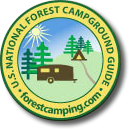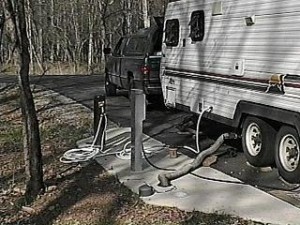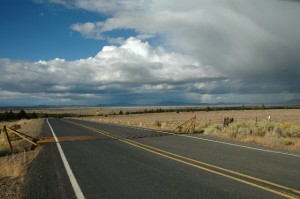Blurring the gender lines means better RVing
The day was comfortably cool and the sky a bright blue – perfect hiking weather. After weeks of clouds and drizzle we were ready for a hike. What we didn’t realize was that the weather had weakened a portion of the trail. What happened was one of those nightmares were everything happens in slow motion but you still can’t prevent stuff from happening.
What we didn’t realize was that the portion of the trail had been weaken the weeks of wet conditions. Suddenly, the edge of the trail gave way and Fred, my husband, tumbled off the trail down the embankment. Down he went until a large cement block brought him to an abrupt halt. When I reached him he was pale and panting. I was sure some damage had been done. “I’m fine. Just need to catch my breathe,” Fred responded to my worried look.
Well, he wasn’t “fine.” Nothing was broken, Fred had seriously bruised ribs and was out of action of the next couple of weeks. This meant I would be setting-up and taking-down our rig (at that time it was a 27′ travel trailer and Dodge Ram 3/4 T pick-up truck). Although I seen the tasks performed, up to then I had never done but I am a quick study.
The lesson we learned from Fred’s fall was that there is a need a for each of know each other’s “jobs.” In other words, blurring the gender lines means better RVing. There are females who do not know how to drive their RV. I can’t help but wonder what would they do if their driver was not capable of doing this task. Yes, manipulating a big, bulky RV is scary. It could intimidate the most brave-hearted individual but if he can do it, so can she. And the same goes for maneuvering around the gallery/kitchen to prepare dinner.
Individuals who hesitate to drive an RV should first take advantage of a big open road. Just trade seats for awhile and get the feel of driving your rig. Start out slowly and get going. Remember to turn on your hazard lights to warn others you are not going “full-speed-ahead”. As you build confidence your speed will also increase, and pretty soon you’ll be driving like a pro. Of course, the next step is driving on smaller roads with curves, narrow shoulders and greater traffic. Last, tackle backing up and parking. Learn this driving thing in stages, reminding your partner you need assistance not criticism, and it will be mastered in no time. (Just remember how long it took you to master baking an apple pie – be patient with yourself.) Then, when the driver gets tired or isn’t feeling well, you can take over.
Maybe it’s attention to detail, but navigation seems to always fall on the female team member. According to an informal survey, while money might have been the root of many disagreements before life on the road, giving and taking directions are a primary cause of arguments while on the road. The sad truth is, no matter how much preparation, there will be misdirections. When the driver realizes maps do not tell you which lane to be in for a specific turn, that every state seems to have a “Centerville,” road signs oftentimes do not list your intended destination, and “east” on the road sign does not mean the direction the sun rises, things will get better.
There are some people who have trouble with directions, even when they are facing the setting sun with a compass in their hand and a map spread out across their lap. Asking directions doesn’t always help. I remember directions we were given in a Southern state. They went something like: “Go down this away to the Floyd’s red barn, turn left at the white fence, and it’s across from the lightning struck elm tree.” Now the only problem, who’s Floyd and the barn burned down a couple of decades ago. In the West, directions are given in units of time plus landmarks. “Drive 20 minutes to the river and turn right after the bridge” works well if you remember to ask what speed should you be traveling.
Just as good navigating skills are learned, the same is true for successfully mastering the art of cooking in an RV’s galley or over a campfire. Many males can prepare great meals on a backyard grill, but there is a complexity of meal preparation in the confines of a RV galley or a wood burning campfire that must be learned. I’m sure this is why pre-packaged, convenience foods served on paper plates with plastic silverware were invented.
One last suggest, just as the novice RV driver doesn’t appreciate criticism, the same goes for the novice camping cook.
There was a campground hostess who couldn’t understand why, when they dry camped, her husband complained bitterly about the number of dishes she washed. She didn’t appreciate what a task it was to refill the fresh water tanks, and he didn’t understand her water conservation tricks only went so far. Then one caught a flu with the other soon to follow. During this period of illness, each did other’s chores for a few days. They soon learned the truth of the matter. Washing dishes and refilling the fresh water tank are necessary tasks, but neither is fun. Now they are both looking for ways to make the other’s task easier. (She uses more paper plates and he keeps a three-gallon jug of drinking water on the picnic table.)
Okay, there are difference between gender but tasks should be identified those differences. If you are considering an RV lifestyle, blurring those differences will make for a more pleasant journey. Cross-training, reversing roles and learning to do the other’s jobs will help to insure a safe and successful journey.





